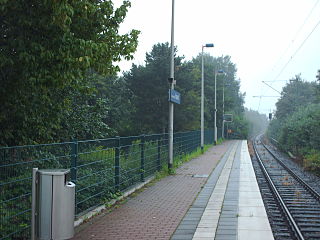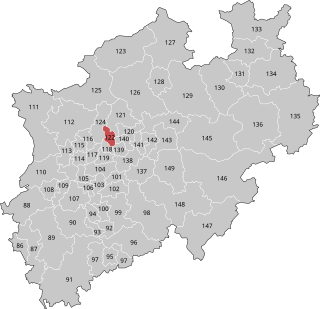
Münster is an independent city in North Rhine-Westphalia, Germany. It is in the northern part of the state and is considered to be the cultural centre of the Westphalia region. It is also a state district capital. Münster was the location of the Anabaptist rebellion during the Protestant Reformation and the site of the signing of the Treaty of Westphalia ending the Thirty Years' War in 1648. Today, it is known as the bicycle capital of Germany.

Gelsenkirchen is the 25th-most populous city of Germany and the 11th-most populous in the state of North Rhine-Westphalia with 262,528 (2016) inhabitants. On the Emscher River, it lies at the centre of the Ruhr area, the largest urban area of Germany, of which it is the fifth-largest city after Dortmund, Essen, Duisburg and Bochum. The Ruhr is located in the Rhine-Ruhr metropolitan region, the second-biggest metropolitan region by GDP in the European Union. Gelsenkirchen is the fifth-largest city of Westphalia after Dortmund, Bochum, Bielefeld and Münster, and it is one of the southernmost cities in the Low German dialect area. The city is home to the football club Schalke 04, which is named after Gelsenkirchen-Schalke. The club's current stadium Veltins-Arena, however, is located in Gelsenkirchen-Erle.

Herne is a city in North Rhine-Westphalia, Germany. It is located in the Ruhr area directly between the cities of Bochum, and Gelsenkirchen.

Oberhausen is a city on the river Emscher in the Ruhr Area, Germany, located between Duisburg and Essen. The city hosts the International Short Film Festival Oberhausen and its Gasometer Oberhausen is an anchor point of the European Route of Industrial Heritage.

Borken is a town and the capital of the district of the same name, in North Rhine-Westphalia, Germany.

Scholven Power Station is a coal-fired power plant in Gelsenkirchen, Germany. With an installed capacity of 2,126 megawatts, it is one of the largest power stations in Europe. It is owned by Uniper.

The Regionalliga West was the second-highest level of the German football league system in the west of Germany from 1963 until the formation of the 2. Bundesliga in 1974. It covered the state of Nordrhein-Westfalen, the most populous state of Germany.

The 2. Oberliga West was the second-highest level of the German football league system in the west of Germany from 1949 until the formation of the Bundesliga in 1963. It covered the state of North Rhine-Westphalia, the most populous state of Germany.

The Gauliga Westphalia was the highest football league in the Prussian province of Westphalia and the small Free State of Lippe from 1933 to 1945. Shortly after the formation of the league, the Nazis reorganised the administrative regions in Germany, and the GaueWestphalia-North and Westphalia-South replaced the Prussian province and the Free State.

Gelsenkirchen Hauptbahnhof is a railway station in the German city of Gelsenkirchen. It connects the city to the regional and long-distance rail service of Deutsche Bahn and other railway companies in Germany.

Musiktheater im Revier (MiR) is the venue for performing opera, operetta, musical theatre and ballet in Gelsenkirchen, Germany. It opened on 15 December 1959; it is listed since 1997 as a protected cultural monument.

The Oberhausen-Osterfeld Süd–Hamm railway, also called the Hamm-Osterfeld line, is a 76-kilometre long double-track electrified main line railway at the northern edge of the Ruhr in the German state of North Rhine-Westphalia.

Gelsenkirchen-Buer Nord station is located in the city of Gelsenkirchen in the German state of North Rhine-Westphalia. It is on the Gelsenkirchen-Buer Nord–Marl Lippe railway. The current station was opened in 1998 and is classified by Deutsche Bahn as a category 6 station as a halt (Haltepunkt). It replaced a station 600 metres to the southwest, which had been opened in 1905.

Gelsenkirchen-Hassel is a railway station on the Gelsenkirchen-Buer Nord–Marl Lippe railway in Gelsenkirchen in the German state of North Rhine-Westphalia. It is classified by Deutsche Bahn as a category 6 station. It was opened on 27 September 1968. It has a platform on the west side of the track. It can be reached via stairs and a ramp.

SV Rotthausen was a German association football club from the district of Rotthausen in Gelsenkirchen, North Rhine-Westphalia. The team was founded in 1912 and played briefly in the Gauliga Westfalen (I), one of 16 top-flight regional circuits in Germany prior to World War II. In the 1990s, SV played four seasons in the Oberliga Westfalen (IV). After bankruptcy in 2000, successor side SSV Rotthausen joined 1.FC Achternberg to form SSV/FCA Rotthausen 2000 which currently competes in the eighth-tier Bezirksliga Westfalen.

STV Horst-Emscher was a German association football club from the city of Gelsenkirchen, North Rhine-Westphalia. The club's greatest success has been to qualify for the 1950 German football championship, where it was knocked out by SpVgg Fürth. Between 1947 and 1959 it spent eight seasons in the tier one Oberliga West. In 1967 the club also won the German amateur football championship. The club also made two appearances in the DFB-Pokal, the German Cup, in 1954–55 and 1988–89. STV folded in mid-season in 2007 because of financial trouble.

The Gelsenkirchen-Buer Nord–Marl Lippe railway is an approximately 17 kilometre-long, electrified and predominantly single-track main line railway in the north of the Ruhr district of the German state of North Rhine-Westphalia. It connects Gelsenkirchen-Buer Nord station on the Oberhausen-Osterfeld Süd–Hamm railway with Marl Lippe junction on the Wanne-Eickel–Hamburg railway. The route is included in the list lines showing local speeds under the VzG route number of 2252. As the railway was planned by the Ruhr coal district association as traffic axis (Verkehrsband) No. 9, it is also colloquially called V9.

Irene Mihalic is a German politician of Alliance 90/The Greens from Gelsenkirchen. A former police officer, Mihailic has been a member of the Bundestag since 2013.

Gelsenkirchen is an electoral constituency represented in the Bundestag. It elects one member via first-past-the-post voting. Under the current constituency numbering system, it is designated as constituency 122. It is located in the Ruhr region of North Rhine-Westphalia, comprising the city of Gelsenkirchen.






















